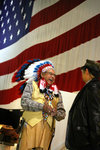

A table was set for an absent, but not forgotten, guest of honor Saturday afternoon as the Veterans Memorial Museum, Chehalis, gave tribute to the unrecovered prisoners of war and those missing in action in a touching ceremonial POW table setting.
Dressed in Native American garments — from his feather bonneted head down to the leather moccasins on his feet — retired Marine Corps staff sergeant and Vietnam War veteran Harvey Rabbitt, Toledo, narrated the POW setting in his native Chippewa language, while museum Executive Director Lee Grimes translated.
Honored guest speaker Bill Moeller, U.S. Army, 187th Regimental Combat Team, shared a series of war stories. He often provoked the attentive audience into laughter. He also told difficult, sometimes embarrassing tales, as well as heartbreaking and shocking stories. He did not spare the gruesome details, nor did he spare himself in the telling of his personal pain and fear.
“I think we should tell the entire story,” Moeller said.
A whisper was heard in the back of the room, “He should write a book.”
The Korean Consulate General, Haryong Lee, gave special thanks to “those who served in the small country so far away. They say about the POW/MIAs that ‘They shall never be forgotten,’ and we will never forget you.”
Four former prisoners of war were in attendance and honored: John Hanson and Bob Meyers, World War II veterans; Bob Mallette, Longview; and Eugene Turner, Seattle.
Nearly 50 Korean War Era veterans attended the remembrance ceremony.
“If they had not stopped Communism at the 39th parallel,” Grimes said, “I’m convinced that it would have spread like cancer throughout the rest of the world.”
Fifteen-year-old Lydia Bowes, Mossyrock, read a poem she had written in honor of the Korean War veterans, “Korea — The Forgotten War,” and received a standing ovation from the veterans.
Four men in full uniform — Dale Ingle, Pete Slempa, Bud Poyns and Monty Miller — each representing a different branch of service, carried the items for the setting, one by one, for placement in solemn ceremony.
The POW setting, also known as the missing-man table, is rich in symbolism. The table represents a prisoner alone against an oppressor.
All items on the table are symbolic: a white tablecloth for purity in the motive to answer the call of duty; a red rose to remind us of the life of each of the missing; a slice of lemon to remind us of the bitter fate of those captured and missing in a foreign land; a pinch of salt, representing the tears of those missing and their families; the wine glass inverted because they are unable to share the table; a lit candle represents the upward reach of their spirit, and an empty chair for the missing soldiers who were not there.
The event featured patriotic music by the American Legion Brass Quintet. The final piece played was a haunting call and response of two trumpets playing “Taps.”
•••
Kimberly Mason is a freelance writer based in Cinebar. She can be contacted at kz@tds.net.